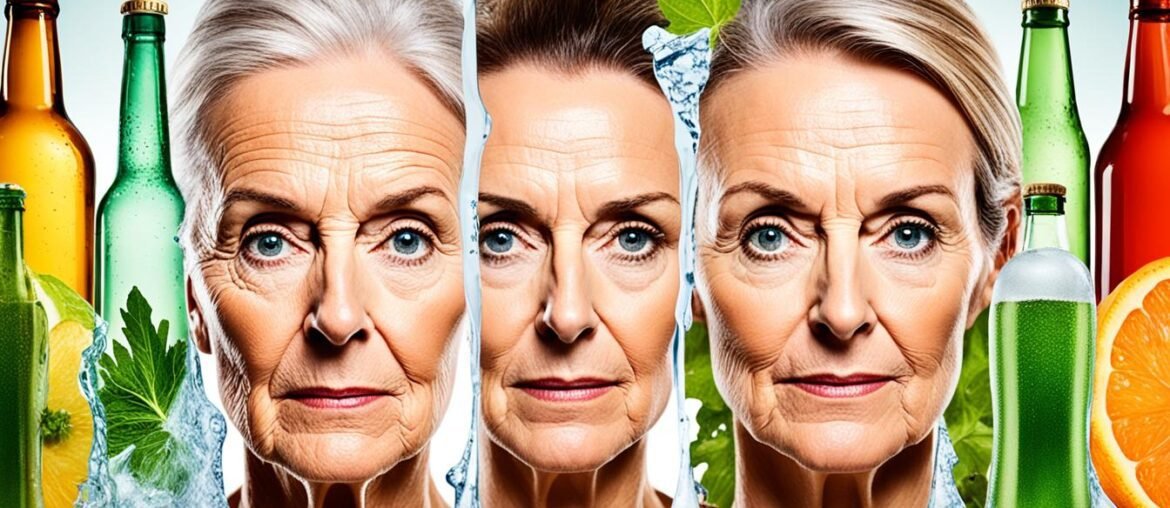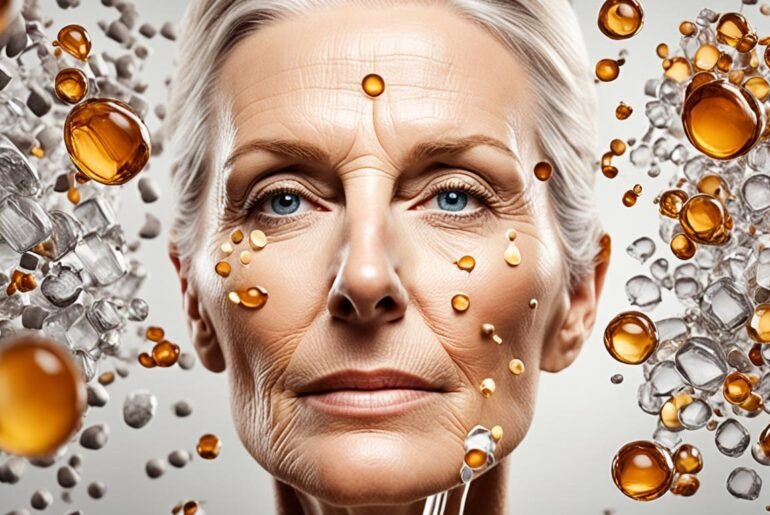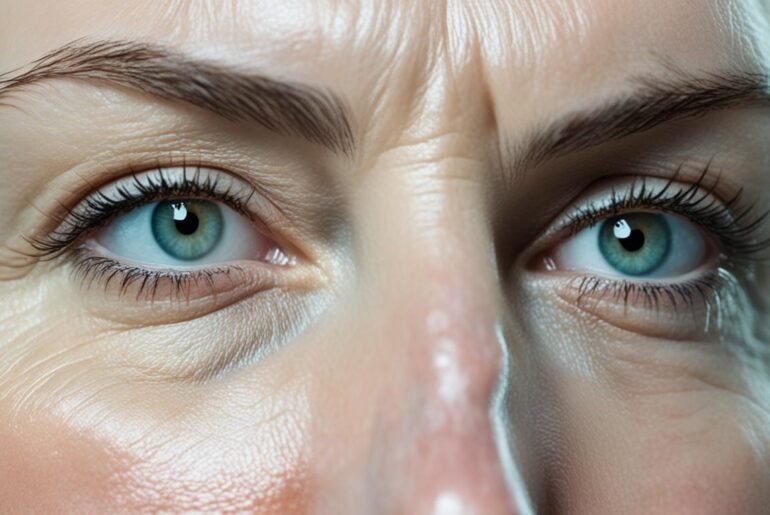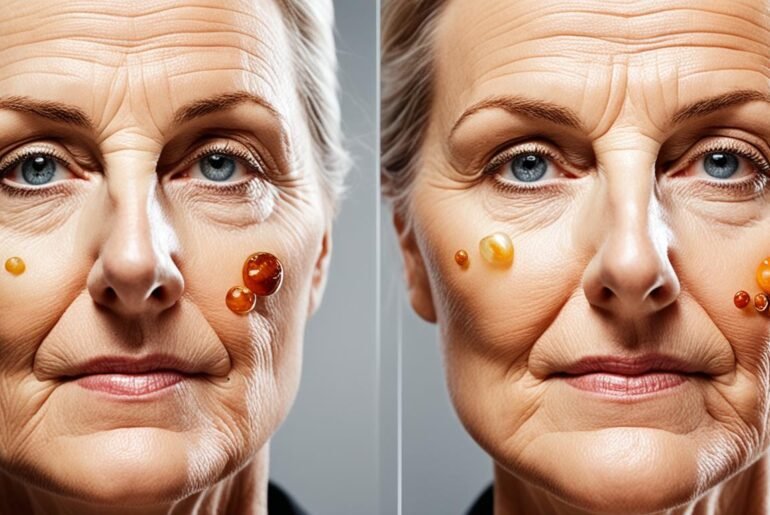Did you know that excessive alcohol consumption can have a negative impact on the appearance of your skin? It’s not just about hangovers and dehydration. Alcohol can actually accelerate the aging process, causing premature wrinkles, loss of elasticity, and a dull complexion.
When we drink alcohol, it depletes levels of important vitamins in our body, especially vitamin A, which is crucial for maintaining healthy skin. As a result, collagen levels in the skin plummet, leading to sagging and wrinkles.
But that’s not all. Alcohol also affects the quality of our sleep. Lack of sleep due to alcohol consumption can cause puffy eyes, dark circles, and a tired appearance. Plus, alcohol can have detrimental effects on various organs in the body, including the heart, liver, pancreas, and brain.
To better understand the impact of alcohol on your skin and overall appearance, let’s explore its effects in more detail.
Key Takeaways:
- Excessive alcohol consumption can accelerate the aging process and lead to premature wrinkles and loss of elasticity.
- Alcohol depletes important vitamins, such as vitamin A, which is essential for maintaining healthy skin.
- Lack of sleep due to alcohol consumption can result in puffy eyes, dark circles, and a tired appearance.
- Alcohol can also have negative effects on various organs in the body.
- Understanding the impact of alcohol on your skin can help you make informed choices for better skin health.
Alcohol and Aging: What are the Effects of Alcohol on the Appearance?
Alcohol consumption can have detrimental effects on our appearance, particularly on our skin. The effects of alcohol on skin appearance are significant and far-reaching. Excessive drinking can cause aging at the cellular level and lead to premature aging and age-related illnesses.
One of the most noticeable effects of alcohol on the appearance is its impact on the liver. The liver plays a crucial role in detoxification, and alcohol can damage this vital organ. Liver damage can result in premature aging, as it affects the organ’s ability to remove toxins from the body. This can lead to the accumulation of harmful substances that contribute to the appearance of wrinkles, dull complexion, and other signs of premature aging.
Moreover, alcohol can deplete essential vitamins in the skin, leading to a loss of collagen and elasticity. Vitamin A, in particular, is important for maintaining healthy skin. Excessive drinking can lower vitamin A levels, resulting in decreased collagen production and skin elasticity. This can manifest as sagging skin, fine lines, and wrinkles.
Alcohol consumption can also have visible effects on our faces. Puffy and red faces are common among heavy drinkers. Alcohol causes blood vessels in the face to widen, leading to a flushed appearance. Widened blood vessels can also increase the risk of spider veins and other vascular issues on the face.
Furthermore, alcohol weakens the immune system, making the skin more susceptible to infections. Heavy drinkers may experience a higher frequency of skin infections, such as acne and other bacterial or fungal infections. These conditions can further contribute to an aged and unhealthy appearance.
In summary, alcohol’s effects on the appearance are significant, particularly when it comes to the skin. Excessive drinking can accelerate the aging process, leading to wrinkles, loss of elasticity, puffy and red faces, widened blood vessels, and increased risks of skin infections. It is essential to be mindful of our alcohol consumption and prioritize our skin’s health to maintain a youthful and vibrant appearance.
Effects of Alcohol on Skin and Aging
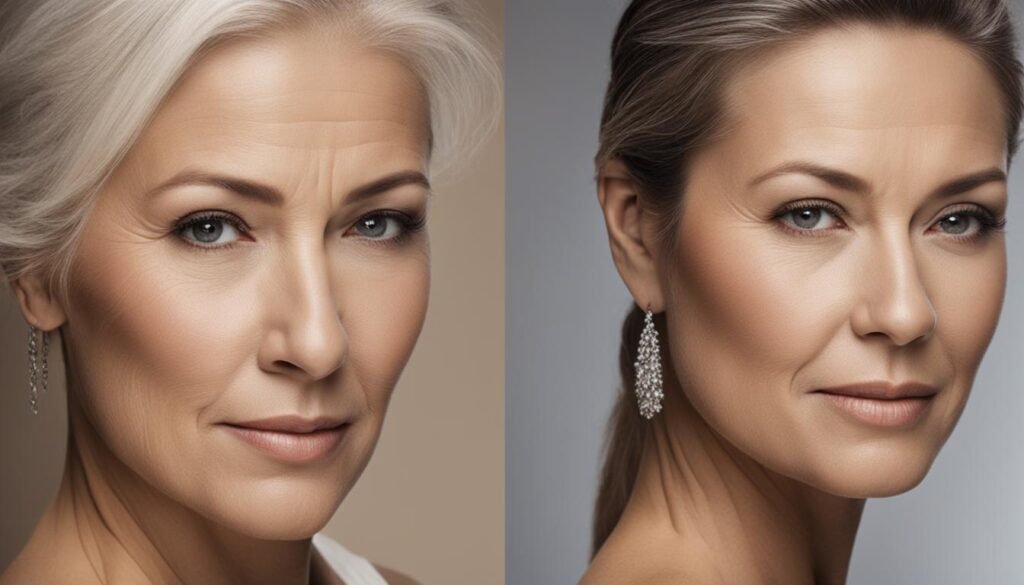
Excessive drinking can have a detrimental impact on the health and appearance of your skin. Alcohol not only depletes essential vitamins in the skin, but it also causes dehydration, leading to wrinkles and dryness. This can contribute to premature aging and skin that lacks elasticity and vibrancy.
One of the key vitamins affected by alcohol consumption is vitamin A. This vitamin plays a crucial role in maintaining collagen levels in the skin, which is responsible for its firmness and plumpness. When alcohol depletes vitamin A, collagen production decreases, leading to sagging and wrinkles.
Additionally, alcohol can cause blood vessels in the face to widen, resulting in a flushed, puffy, and red complexion. These visible signs of alcohol consumption can make individuals appear older than their actual age.
Moreover, heavy drinkers may have a higher risk of developing skin infections. Alcohol compromises the body’s immune system, making it more susceptible to bacterial and fungal infections. This can manifest as acne, dermatitis, or other skin conditions.
To further illustrate the effects of alcohol on skin and aging, here is a visual representation in the form of a table:
| Effects of Alcohol on Skin and Aging | Description |
|---|---|
| Depletion of vitamins | Alcohol depletes vitamin levels in the skin, particularly vitamin A, leading to a loss of collagen and elasticity. |
| Dehydration | Alcohol’s diuretic effect can dehydrate the skin, resulting in dryness and the formation of wrinkles. |
| Flushed and puffy complexion | Alcohol causes blood vessels in the face to widen, leading to a flushed, puffy, and red appearance. |
| Increase risk of skin infections | Alcohol compromises the immune system, making the skin more susceptible to bacterial and fungal infections. |
In summary, alcohol’s impact on skin can have significant consequences on its health and aging process. From depleting essential vitamins to causing dehydration and skin infections, excessive alcohol consumption can contribute to premature aging and a lackluster appearance. To maintain healthy and youthful skin, it is crucial to drink alcohol in moderation and prioritize overall skin care.
Lack of Sleep
Alcohol consumption not only affects the skin but also has a significant impact on sleep quality. Lack of sleep can have a detrimental effect on a person’s overall appearance, making them look older than their actual age.
When alcohol disrupts the sleep cycle, it prevents the body from experiencing the deep, restorative sleep it needs. This can result in various visible signs, such as puffy eyes and bags under the eyes, which contribute to a tired and fatigued appearance.
Poor sleep quality also affects the body’s ability to repair and rejuvenate the skin. During deep sleep, the body produces collagen, a protein responsible for maintaining the skin’s elasticity and reducing wrinkles. When alcohol disrupts the sleep cycle, the production of collagen decreases, leading to a loss of skin tightness and increased signs of aging.
Additionally, alcohol’s impact on sleep can exacerbate other skin issues. Lack of sleep can cause the skin to appear dull and lackluster, and it can even worsen existing skin conditions such as acne or eczema.
“Getting a good night’s sleep is essential for maintaining healthy-looking skin. Alcohol’s interference with sleep can accelerate the signs of aging and negatively impact overall skin health.”
The Effect of Alcohol on Sleep Quality
Alcohol’s impact on sleep quality is a result of several factors. First, alcohol acts as a sedative and initially helps individuals fall asleep faster. However, as the body metabolizes the alcohol, it disrupts the normal sleep cycle, preventing deeper stages of sleep from occurring.
Alcohol also affects the production of melatonin, a hormone responsible for regulating sleep-wake cycles. Disruptions in melatonin levels can further contribute to poor sleep quality.
The consumption of alcohol close to bedtime can also cause frequent wake-ups throughout the night. This fragmented sleep pattern can leave individuals feeling groggy and unrested when they wake up.
It’s important to note that while alcohol may make people feel drowsy and initially promote sleep, its overall impact on sleep quality is negative. A night of alcohol-induced sleep may not be as refreshing or rejuvenating as a night of alcohol-free sleep.
The Importance of Restorative Sleep
Restorative sleep is crucial for maintaining healthy skin and a youthful appearance. During deep sleep, the body repairs damaged cells, regenerates tissues, and releases growth factors that support collagen production.
Without adequate restorative sleep, the skin’s regenerative processes are disrupted, leading to visible signs of aging such as wrinkles, dryness, and a dull complexion.
Improving Sleep Quality
For individuals concerned about the impact of alcohol on their sleep quality and overall appearance, reducing alcohol consumption or abstaining from alcohol can be beneficial. By allowing the body to experience uninterrupted, deep sleep, individuals can optimize their skin’s health and minimize the signs of aging.
Establishing a regular sleep routine and creating a sleep-friendly environment can also contribute to better sleep quality. This includes setting a consistent bedtime, creating a relaxing atmosphere free from distractions, and avoiding stimulating activities or substances close to bedtime.
| Effects of Alcohol on Sleep Quality |
|---|
| Disrupts the sleep cycle |
| Reduces deep, restorative sleep |
| Interferes with collagen production |
| Leads to puffy eyes and bags under the eyes |
| Causes fragmented sleep patterns |
| Disrupts melatonin levels |
| Contributes to a tired and fatigued appearance |
How Excessive Alcohol Consumption Ages the Mind and Body
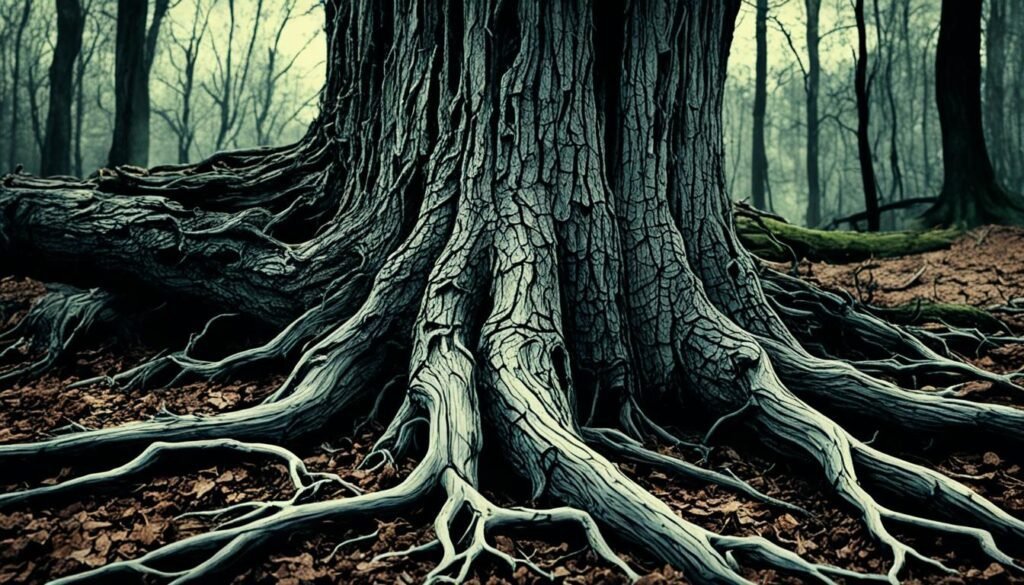
Excessive alcohol consumption can have detrimental effects on both the mind and body. It can take a toll on various internal organs, including the heart, liver, pancreas, and brain. The impacts of alcohol on these organs can contribute to premature aging and serious health complications.
One of the main consequences of excessive alcohol consumption is the harm it can cause to the heart. Alcohol can elevate blood pressure and lead to irregular heartbeats, increasing the risk of heart diseases. Over time, this damage can age the heart and affect its overall function.
The liver is another organ that bears the brunt of excessive alcohol intake. Chronic alcohol abuse can result in liver conditions such as fatty liver, alcoholic hepatitis, and cirrhosis. These conditions not only accelerate the aging process but also have severe implications for overall health and well-being.
Additionally, alcohol can negatively impact the pancreas, affecting its ability to produce insulin efficiently. This can lead to an increased risk of developing diabetes, which can further contribute to aging and various health issues.
One of the most significant impacts of alcohol consumption is on the brain. Excessive alcohol intake can result in brain shrinkage and impair cognitive function. It can lead to memory loss, difficulty concentrating, and decreased mental acuity. These effects can significantly impact daily functioning and contribute to premature aging of the mind.
Table: Effects of Alcohol on Internal Organs
| Organ | Effects of Alcohol |
|---|---|
| Heart | Elevated blood pressure, irregular heartbeats, increased risk of heart diseases |
| Liver | Fatty liver, alcoholic hepatitis, cirrhosis |
| Pancreas | Impaired insulin production, increased risk of diabetes |
| Brain | Brain shrinkage, memory loss, impaired cognitive function |
Excessive alcohol consumption takes a toll on the mind and body, contributing to premature aging and a range of health issues. It is crucial to prioritize health and well-being by drinking alcohol responsibly and seeking help if struggling with alcohol abuse.
Does Alcohol Age Your Appearance in Other Ways?
In addition to its effects on the skin, alcohol can impact a person’s weight, hair, personal hygiene, and body odor. Heavy drinking can lead to weight gain due to the high calorie content of alcoholic beverages. It can also contribute to hair loss and poor hygiene habits. Alcohol can leave a person sweaty and odorous, affecting their overall appearance and smell.
Excessive alcohol consumption can have detrimental effects on both physical and mental well-being. Let’s explore how alcohol can age your appearance in other ways.
Alcohol’s Impact on Weight
One of the lesser-known effects of alcohol is its impact on weight. Alcoholic beverages are often high in calories, and excessive drinking can contribute to weight gain. The empty calories from alcohol can disrupt the body’s metabolism and lead to an increase in fat accumulation, particularly around the abdomen.
Weight gain from alcohol can affect a person’s overall appearance, making them look older and less healthy. It can also increase the risk of other health issues such as obesity, diabetes, and heart disease.
Alcohol and Hair Loss
Alcohol consumption can also have negative effects on hair health, potentially leading to hair loss. Heavy drinking can disrupt the absorption of essential nutrients, such as vitamins and minerals, that are necessary for healthy hair growth.
Additionally, alcohol can indirectly contribute to hair loss by affecting hormone levels. Excessive drinking can disrupt hormonal balance and lead to conditions like testosterone imbalances or thyroid dysfunction, both of which can cause hair thinning and loss.
Alcohol’s Influence on Personal Hygiene
Heavy alcohol consumption can lead to poor personal hygiene habits. When under the influence, individuals may neglect their regular hygiene routines, such as brushing their teeth regularly or showering daily. This can result in oral health issues like cavities and gum disease, as well as body odor.
Poor personal hygiene can affect a person’s appearance, making them appear unkempt and older than their actual age. It can also have negative social consequences, impacting personal and professional relationships.
Effects of Alcohol on Body Odor
Alcohol can affect a person’s body odor in multiple ways. Heavy drinking can lead to increased sweating, which can result in unpleasant body odor. Alcohol is also metabolized in the body to produce acetic acid, which can contribute to a distinctive alcohol odor in breath and urine.
Body odor can significantly impact a person’s overall appearance and how others perceive them. Unpleasant smells can make individuals seem less attractive and undermine their confidence.
To sum up, alcohol’s impact on appearance extends beyond skin aging. It can contribute to weight gain, hair loss, poor personal hygiene, and unpleasant body odor. Limiting alcohol consumption and adopting a healthy lifestyle can help maintain a youthful appearance and overall well-being.
Alcohol Affects a Person’s Weight
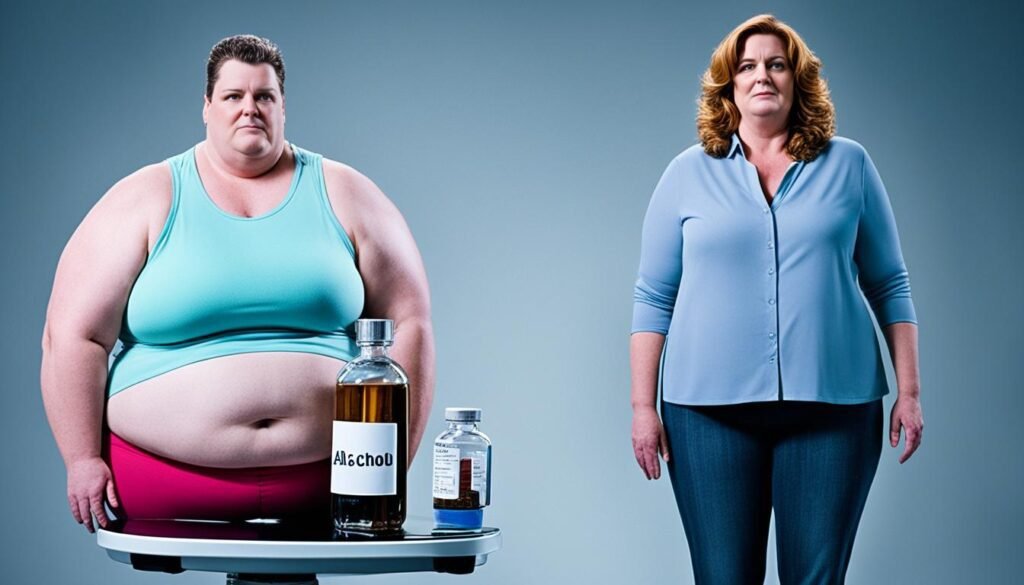
When it comes to weight management, alcohol consumption can have a significant impact. Alcoholic beverages are notorious for their high calorie content, which can contribute to weight gain over time. Whether it’s a pint of beer, a glass of wine, or a mixed cocktail, these drinks can add up and impact your overall calorie intake.
Additionally, alcohol has been found to increase a person’s appetite, especially for salty and fatty foods. This can lead to overeating and make it difficult to maintain a healthy diet. But why does alcohol have this effect on our appetite?
Research suggests that alcohol can disrupt the body’s hormone levels, including reducing the levels of a hormone called leptin, which helps regulate appetite and signals satiety. When leptin levels are decreased, our brain may not receive the proper signals to stop eating, leading to increased food consumption.
Table: Impact of Alcohol on Weight Gain and Appetite
| Type of Alcohol | Calorie Content per Standard Serving |
|---|---|
| Beer | Approximately 150-200 calories |
| Wine | Approximately 120-150 calories |
| Liquor (Vodka, Rum, Whiskey) | Approximately 100-120 calories |
Those who regularly consume alcohol, especially in excess, may be more prone to unhealthy weight gain. This weight gain can not only affect a person’s appearance but also contribute to various health issues such as obesity, diabetes, and heart disease.
To maintain a healthy weight and overall well-being, it is essential to be mindful of your alcohol consumption and make informed choices. Opting for lower-calorie alcoholic beverages or alternating alcoholic drinks with non-alcoholic options can help reduce calorie intake and mitigate the effects on your weight.
Understanding Hormones and Alcohol’s Impact
The relationship between alcohol and appetite is complex and influenced by various factors, including hormonal changes. Alcohol consumption can disrupt the delicate balance of hormones in our bodies, leading to altered appetite regulation.
Leptin, a hormone produced by fat cells, plays a crucial role in signaling fullness to the brain. However, alcohol consumption has been linked to decreased levels of leptin, resulting in an increased desire for food and an overall higher caloric intake.
Furthermore, alcohol can affect other hormones that regulate appetite, such as ghrelin and neuropeptide Y. Ghrelin, known as the hunger hormone, stimulates appetite, while neuropeptide Y promotes food intake and decreases energy expenditure. Alcohol consumption can disrupt the normal levels of these hormones, leading to an increased appetite and a preference for high-calorie foods.
It is important to note that the effects of alcohol on weight gain and appetite can vary depending on several factors, including individual metabolism, drinking patterns, and overall dietary habits. While moderate alcohol consumption may not have significant effects, excessive and habitual drinking can contribute to unhealthy weight gain over time.
Alcohol Affects a Person’s Hair
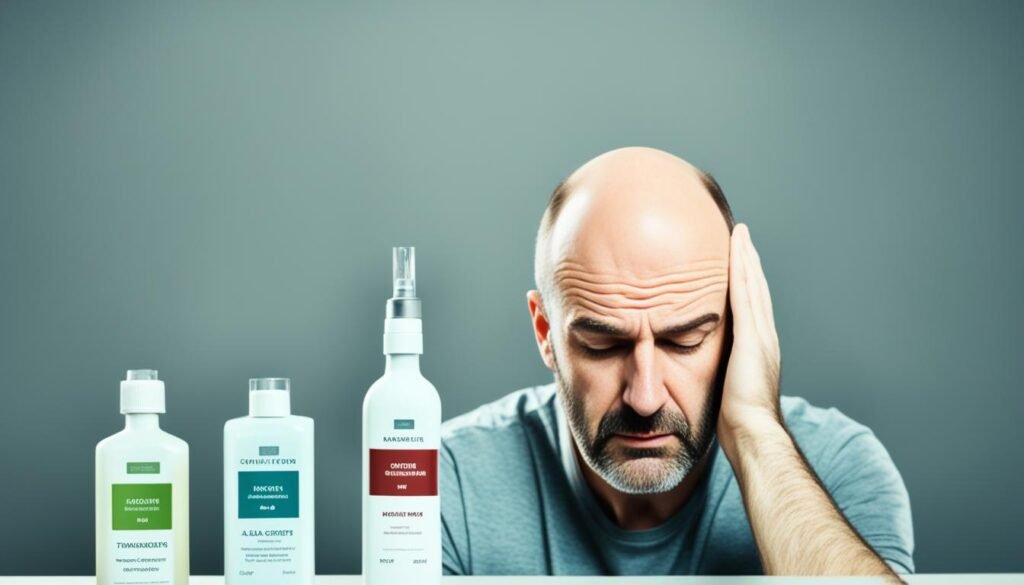
Excessive alcohol consumption can have detrimental effects on the health of your hair, potentially leading to severe hair loss. While there is no direct link between alcohol and hair loss, heavy drinking can contribute to nutritional deficiencies and hormonal imbalances that adversely affect the condition of your hair.
Alcohol can hinder the absorption of essential nutrients that are vital for maintaining healthy hair growth. Nutritional deficiencies, such as insufficient levels of vitamins and minerals, can weaken the hair follicles and lead to increased hair shedding and thinning.
Furthermore, alcohol consumption may impact thyroid function, which can also contribute to hair loss. The thyroid gland regulates hormone production, including those related to hair growth. Disruptions in thyroid function caused by alcohol consumption may result in hair thinning and decreased hair density.
To maintain optimal hair health, it is important to moderate alcohol consumption and ensure a balanced diet enriched with essential nutrients. This will help support healthy hair growth and prevent potential hair loss.
The Impact of Alcohol on Nutrient Absorption
Alcohol can interfere with nutrient absorption in the body, leading to deficiencies that can harm the health of your hair. It affects the gastrointestinal tract by inhibiting the absorption of vital vitamins and minerals, such as biotin, zinc, and iron, which are essential for hair growth and strength.
In addition, alcohol can impair the body’s ability to utilize and store nutrients. This can lead to malnutrition and negatively impact the health and vitality of your hair.
Alcohol and Thyroid Issues
Thyroid imbalances can contribute to hair loss, and alcohol consumption may exacerbate these issues. Alcohol can disrupt the normal function of the thyroid gland, which can result in decreased production of thyroid hormones.
Thyroid hormones play a crucial role in regulating hair growth, and any abnormalities in their levels can lead to hair thinning and increased hair loss. Excessive alcohol consumption can contribute to these imbalances, further compromising the health of your hair.
It is important to note that while alcohol may not directly cause hair loss, its negative impact on nutrient absorption and thyroid function can contribute to hair thinning and loss over time.
| Nutrient | Role in Hair Health | Food Sources |
|---|---|---|
| Biotin | Promotes hair growth and strength | Eggs, nuts, seeds, sweet potatoes |
| Zinc | Supports hair follicle health | Shellfish, legumes, whole grains |
| Iron | Aids in oxygen transportation to hair follicles | Red meat, spinach, lentils |
In the next section, we will explore how excessive alcohol consumption can impact overall personal hygiene and body odor.
Alcohol Binges Lead to Poor Hygiene
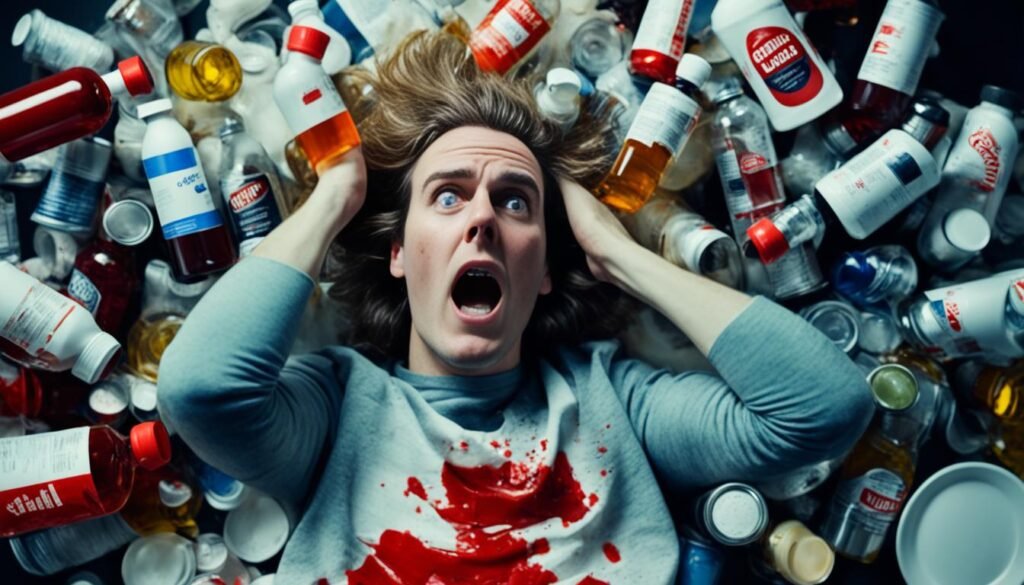
When a person drinks excessively, the impact on their hygiene can be significant. Neglecting their normal hygiene routine due to alcohol consumption can lead to various oral health issues and contribute to an older appearance. Poor hygiene habits resulting from alcohol binges can have severe consequences for overall health and well-being.
Effects of Alcohol on Oral Health
Excessive alcohol consumption can have detrimental effects on oral health. The acidic nature of alcoholic beverages can erode tooth enamel, making teeth more susceptible to cavities. Additionally, alcohol can cause dry mouth, reducing saliva production, which plays a crucial role in neutralizing acids and protecting the teeth.
Poor oral hygiene resulting from alcohol binges can exacerbate these effects. Neglecting regular brushing and flossing can allow bacteria to thrive in the mouth, leading to plaque buildup, gum disease, and bad breath.
Acne and Alcohol Consumption
Alcohol consumption can also impact skin health, including the presence of acne. Alcohol’s dehydrating effects can strip the skin of its natural oils, leading to dryness and inflammation. This can clog pores and contribute to the development of acne.
Furthermore, excessive alcohol consumption can disrupt the hormonal balance in the body, including increased levels of certain hormones that stimulate oil production. This excess oil on the skin can further contribute to the formation of acne.
| Effects of Alcohol on Hygiene | Effects on Oral Health | Effects on Acne |
|---|---|---|
| Poor oral hygiene | Cavities, plaque buildup, gum disease | Dry and inflamed skin, increased oil production |
| Bad breath | Tooth enamel erosion | Clogged pores |
| Increased risk of infections | Dry mouth, reduced saliva production | Inflammation and acne formation |
It is crucial to maintain good oral hygiene practices, including regular brushing, flossing, and dental check-ups, even when consuming alcohol. Staying hydrated and practicing moderation can also help minimize the negative effects on oral and overall hygiene.
Alcohol and Body Odor
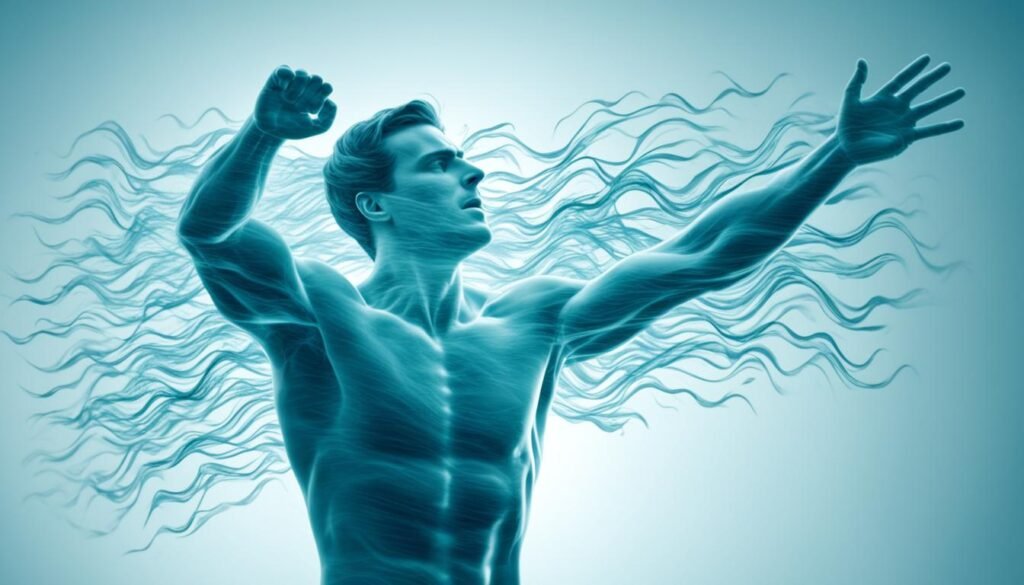
Heavy drinking can have unpleasant effects on the body’s odor. Excessive alcohol consumption can lead to increased sweating, resulting in body odor that may be more noticeable and offensive. The combination of alcohol’s impact on body chemistry and increased perspiration can contribute to an unpleasant smell that affects a person’s overall appearance and may make them appear less youthful and healthy.
In addition to body odor, alcohol can also affect breath odor. The consumption of alcoholic beverages can lead to a stronger, more pungent breath, often described as “alcohol breath.” This can be attributed to the breakdown of alcohol in the body, which releases volatile compounds that are carried through the breath. The effects of alcohol on breath odor can be a source of embarrassment and may negatively impact a person’s confidence and social interactions.
Furthermore, alcohol can also influence the odor of urine. Drinking alcohol leads to increased fluid intake and frequent urination, which can result in a stronger and more distinct odor in urine. The odor may be described as unpleasant or stronger than usual. This effect of alcohol on urine odor can be indicative of dehydration and the body’s attempt to eliminate alcohol and its metabolites.
It is important to note that the effects of alcohol on body odor can vary depending on factors such as individual metabolic rate, alcohol consumption volume, and overall health. However, reducing alcohol intake or abstaining from alcohol altogether can help minimize these effects and contribute to a fresher and more pleasant body odor.
To learn more about the effects of alcohol on body odor, sweating, breath, and urine, refer to the table below:
| Effect | Description |
|---|---|
| Increased Sweating | Alcohol can lead to excessive sweating, which can result in stronger body odor. |
| Alcohol Breath | Consumption of alcohol can lead to breath with a distinct and often unpleasant odor. |
| Stronger Urine Odor | Alcohol can cause dehydration and frequent urination, resulting in urine with a stronger odor. |
Other Ways that Alcohol Impacts Aging
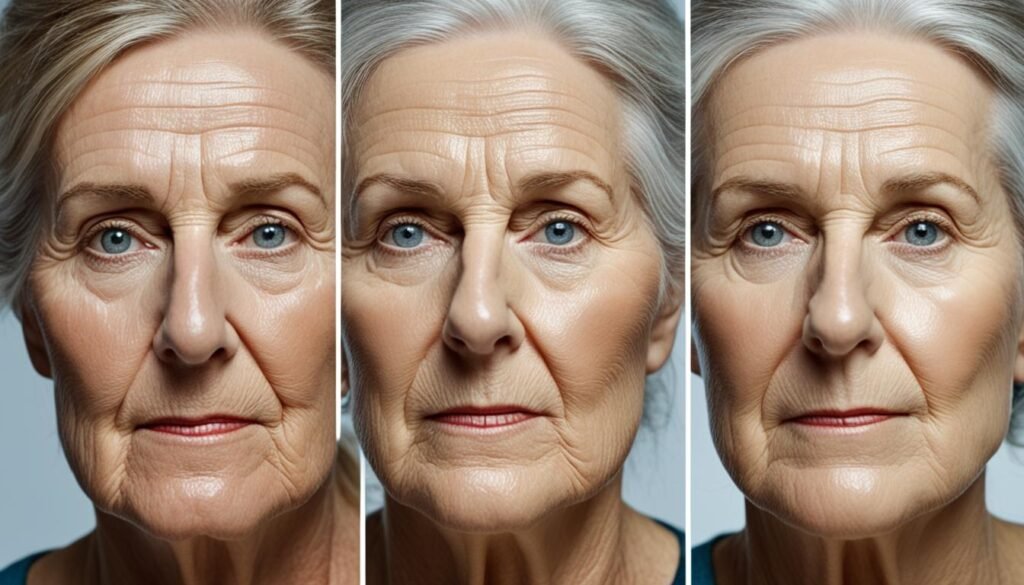
While alcohol’s effects on the skin are well-known, its impact on aging goes beyond skin appearance. Excessive alcohol consumption can have detrimental effects on various aspects of our health and well-being, contributing to premature aging. Let’s explore some of the other ways that alcohol can influence the aging process.
Alcohol’s Impact on the Brain
Alcohol can have a profound influence on cognitive function. Excessive drinking can impair memory, attention, and decision-making abilities. Prolonged alcohol abuse may lead to cognitive decline and increase the risk of developing neurological disorders such as dementia. It’s essential to recognize the potential harm that alcohol can cause to our brain health as we age.
Alcohol and Cognitive Function
Heavy alcohol consumption can disrupt our cognitive function, affecting our ability to think clearly and solve problems. Alcohol impairs judgment and coordination, making tasks that require concentration and precision more challenging. Regular and excessive alcohol intake can significantly impact our overall cognitive performance.
Alcohol’s Influence on Free Radicals and Sleep Disruptions
Alcohol can increase the production of free radicals in our bodies. Free radicals are unstable molecules that can damage cells and contribute to aging. Excessive alcohol consumption can also disrupt sleep patterns, leading to poor sleep quality and duration. Lack of quality sleep accelerates the aging process and affects our overall well-being.
“The impact of alcohol on aging extends beyond skin appearance, affecting cognitive function, free radicals, and sleep disruptions. It’s crucial to be aware of these potential effects and make informed choices about alcohol consumption.”
Understanding the various ways that alcohol impacts aging can help us make healthier choices and maintain our well-being as we grow older.
Through moderation and responsible consumption, we can mitigate the negative effects of alcohol on our bodies and improve our chances of healthy aging.
Conclusion
Excessive alcohol consumption can have significant negative effects on the appearance of skin, leading to premature aging and various skin issues. The damage caused by alcohol can result in wrinkles, loss of elasticity, and puffy and red faces. Moreover, alcohol can impact other aspects of appearance, including weight, hair, personal hygiene, and body odor, contributing to an older and less healthy look.
To combat the detrimental effects of alcohol on the skin and overall appearance, seeking help from a trusted rehab facility is vital. Overcoming alcohol addiction can improve not only the health and appearance of the skin but also enhance one’s overall well-being. Taking proactive steps towards sobriety can lead to a rejuvenated and youthful appearance, as well as a better quality of life.
It’s important to prioritize self-care and seek professional support to break free from the damaging cycle of excessive alcohol consumption. By doing so, individuals can reclaim their skin’s health and improve their overall appearance, allowing them to look and feel their best.
FAQ
Does drinking alcohol age your skin?
Yes, excessive alcohol consumption can have a negative impact on the appearance of your skin and contribute to premature aging. It can lead to wrinkles, loss of elasticity, puffy and red faces, and other skin issues.
What are the effects of alcohol on the appearance?
Alcohol can deplete levels of vitamins in the skin, especially vitamin A, leading to a loss of collagen and elasticity. It can also dehydrate the skin, causing wrinkles and dryness. Additionally, alcohol’s impact on weight, personal hygiene, and body odor can contribute to an older appearance.
What are the effects of alcohol on skin and aging?
Alcohol’s impact on the skin can include increased risks of skin infections, widened blood vessels in the face, and puffy and red faces. It can also deplete levels of vitamins in the skin, leading to a loss of collagen and elasticity.
How does alcohol affect sleep quality?
Alcohol can disrupt the sleep cycle, resulting in a lack of restorative sleep. This can lead to puffy eyes, bags under the eyes, and an overall tired appearance. Poor sleep quality can make a person look and feel older than their actual age.
What are the effects of excessive alcohol consumption on the mind and body?
Chronic heavy drinking can contribute to age-related illnesses and have detrimental effects on various internal organs, including the heart, liver, pancreas, and brain. It can lead to high blood pressure, irregular heartbeat, liver conditions, and brain shrinkage, which can contribute to premature aging and serious health complications.
Does alcohol age your appearance in other ways?
Yes, heavy drinking can contribute to weight gain, hair loss, poor personal hygiene, and body odor. Alcohol’s impact on weight can result from its high calorie content and effects on appetite and hormone levels. It can also lead to nutritional deficiencies or hormonal imbalances that affect hair health. Excessive alcohol consumption can also contribute to cavities, acne, and other oral health issues, as well as increased sweating and body odor.
How does alcohol affect a person’s weight?
Alcohol consumption can lead to weight gain due to its high calorie content, increased appetite, and effects on hormone levels. Heavy drinking can contribute to unhealthy weight gain and affect a person’s overall appearance.
Does alcohol contribute to hair loss?
While there is no direct link between alcohol and hair loss, heavy drinking may lead to nutritional deficiencies or hormonal imbalances that affect hair health. Alcohol can prevent the absorption of essential nutrients and may also contribute to thyroid issues, which can cause thinning hair.
How does alcohol impact personal hygiene?
When a person drinks excessively, they may neglect their normal hygiene routine, leading to dental issues, acne, and other hygiene-related problems. Poor hygiene habits can contribute to an older appearance and affect a person’s overall health and well-being.
Does alcohol affect body odor?
Yes, heavy drinking can lead to increased sweating, resulting in body odor, bad breath, and smelly urine. These effects of alcohol on body odor can contribute to a person’s overall appearance and make them appear less youthful and healthy.
How else does alcohol impact aging?
Excessive alcohol consumption can impair cognitive function, disrupt sleep, and increase free radicals in the body. These effects can contribute to premature aging and have long-term implications for overall health and well-being.
Conclusion
Excessive alcohol consumption can have significant negative effects on the appearance of the skin and contribute to premature aging. Seeking help from a trusted rehab facility can help individuals overcome alcohol addiction and improve their skin’s health and appearance.

